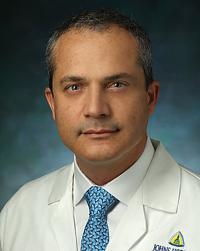Research Lab Results
-
Drew Pardoll Lab
The Pardoll Lab focuses on the regulation of antigen-specific T cell responses and studies approaches to modify these responses for immunotherapy. Pardoll has a particular interest in cancer immunology and his lab’s studies on basic immunologic mechanisms have led to the development and design of a number of cancer vaccines and discovery of key checkpoint ligands and receptors, such as PD-L2, LAG-3 and neuritin, many of which are being targeted clinically. Our primary pursuits are discovering and elucidating new molecules that regulate immune responses, investigating the biology of regulatory T cells, and better understanding the specific biochemical signatures that allow a patient’s T cells to selectively target cancer cells.
-
Franco D’Alessio Lab
The Franco D’Alessio Lab investigates key topics within the fields of critical care, internal and pulmonary medicine. We primarily explore immunological determinants of acute lung inflammation and repair. Our lab also investigates age-dependent lung immune response in patients with acute lung injury and acute respiratory distress syndrome (ARDS), regulatory T-cells in lung injury and repair, and modulation of alveolar macrophage innate immune response in ARDS.
-
The Hamad Lab
Our research interest is crystalized into three main areas: 1. Type-1 diabetes - Our focus is on understanding how the Fas death pathway regulates the disease and how extracted information can be used to protect high risk individuals and those with new-onset disease. 2. Type 2 diabetes and Obesity - Our lab is studying the role of heparan sulfate proteoglycans (HSPG) in regulating body fat and glucose clearance. 3. Double negative ??T cells - Our studies suggest a critical role for these cells in protecting kidneys from Ischemia reperfusion injury (IRI). Our current focus is understanding their origin and physiological functions. -
Robert Siliciano Laboratory
Research in the Robert Siliciano Laboratory focuses on HIV and antiretroviral therapy (ART). ART consists of combinations of three drugs that inhibit specific steps in the virus life cycle. Though linked to reduced morbidity and mortality rates, ART is not curative. Through our research related to latently infected cells, we've shown that eradicating HIV-1 infection with ART alone is impossible due to the latent reservoir for HIV-1 in resting CD4+ T cells. Our laboratory characterized the different forms of HIV-1 that persist in patients on ART. Currently, we are searching for and evaluating drugs that target the latent reservoir. We are also developing assays that can be used to monitor the elimination of this reservoir. We are also interested in the basic pharmacodynamic principles that explain how antiretroviral drugs work. We have recently discovered why certain classes of antiretroviral drugs are so effective at inhibiting viral replication. We are using this discovery along with experimental and computational approaches to develop improved therapies for HIV-1 infection and to understand and prevent drug resistance. Finally, we are studying the immunology of HIV-1 infection, and in particular, the ability of some patients to control the infection without ART.
-
The Calabresi Lab
The Calabresi Lab is located in the department of Neurology at the Johns Hopkins University School of Medicine. Our group investigates why remyelination occasionally fails following central nervous system demyelination in diseases like multiple sclerosis. Our primary focus is on discovering the role of t-cells in promoting or inhibiting myelination by the endogenous glial cells. -
Schneck Lab
Effective immune responses are critical for control of a variety of infectious disease including bacterial, viral and protozoan infections as well as in protection from development of tumors. Central to the development of an effective immune response is the T lymphocyte which, as part of the adaptive immune system, is central in achieving sterilization and long lasting immunity. While the normal immune responses is tightly regulated there are also notable defects leading to pathologic diseases. Inactivity of tumor antigen-specific T cells, either by suppression or passive ignorance allows tumors to grow and eventually actively suppress the immune response. Conversely, hyperactivation of antigen-specific T cells to self antigens is the underlying basis for many autoimmune diseases including: multiple sclerosis; arthritis; and diabetes. Secondary to their central role in a wide variety of physiologic and pathophysiologic responses my lab takes a broad-based approach to studying T cell responses. -
Andrea Cox Lab
Research in the Andrea Cox Lab explores the immune response in chronic viral infections, with a focus on HIV and the hepatitis C virus (HCV). In our studies, we examine the role of the immune response upon exposure to HCV by examining responses to HCV in a longitudinal, prospective group of high-risk individuals. This enables us to compare the innate, humoral and cellular immune responses to infection with clearance versus persistence. Through our findings, we seek to identify mechanisms of protective immunity against HCV infection and improve HCV vaccine design.
-
Grayson Lab for Craniofacial and Orthopaedic Tissue Engineering
The Grayson Lab focuses on craniofacial and orthopaedic tissue engineering. Our research addresses the challenges associated with spatio-temporal control of stem cell fate in order to engineer complex tissue constructs. We are developing innovative methods to guide stem cell differentiation patterns and create patient-specific grafts with functional biological and mechanical characteristics. We employ engineering techniques to accurately control growth factor delivery to cells in biomaterial scaffolds as well as to design advanced bioreactors capable of maintaining cell viability in large tissue constructs. These technologies are used to enable precise control of the cellular microenvironment and uniquely address fundamental questions regarding the application of biophysical cues to regulate stem cell differentiation. -
Gabsang Lee Lab
Human induced pluripotent stem cells (hiPSCs) provide unprecedented opportunities for cell replacement approaches, disease modeling and drug discovery in a patient-specific manner. The Gabsang Lee Lab focuses on the neural crest lineage and skeletal muscle tissue, in terms of their fate-determination processes as well as relevant genetic disorders. Previously, we studied a human genetic disorder (familial dysautonomia, or FD) with hiPSCs and found that FD-specific neural crest cells have low levels of genes needed to make autonomous neurons--the ones needed for the ""fight-or-flight"" response. In an effort to discover novel drugs, we performed high-throughput screening with a compound library using FD patient-derived neural crest cells. We recently established a direct conversion methodology, turning patient fibroblasts into ""induced neural crest (iNC)"" that also exhibit disease-related phenotypes, just as the FD-hiPSC-derived neural crest. We're extending our research to the neural crest's neighboring cells, somite. Using multiple genetic reporter systems, we identified sufficient cues for directing hiPSCs into somite stage, followed by skeletal muscle lineages. This novel approach can straightforwardly apply to muscular dystrophies, resulting in expandable myoblasts in a patient-specific manner. -
Green Group
The Green Group is the biomaterials and drug delivery laboratory in the Biomedical Engineering Department at the Johns Hopkins University School of Medicine. Our broad research interests are in cellular engineering and in nanobiotechnology. We are particularly interested in biomaterials, controlled drug delivery, stem cells, gene therapy, and immunobioengineering. We are working on the chemistry/biology/engineering interface to answer fundamental scientific questions and create innovative technologies and therapeutics that can directly benefit human health.



